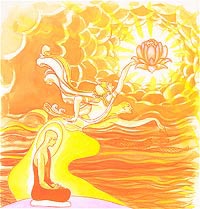26 06 2012 TUESDAY LESSON 649 FREE ONLINE eNālāndā Research And Practice UNIVERSITY And THE BUDDHISTONLINE GOOD NEWS LETTER by ABHIDHAMMA RAKKHITA through http://sarvajan.ambedkar.org
Dhammapada: Verses and Stories 218-Eka Anagamitthera Vatthu- The Person With Higher Urges One with a wish for the Undeclared, Explanation: In that person a deep yearning for the undefined
Dhammapada Verse 218 Chandajato anakkhate Verse 218: He who has developed a desire for the Ineffable (i.e., Nibbana), 1. uddhamsoto: one who is going upstream, i.e., one who is bound for the The Story of an Anagami Thera While residing at the Jetavana monastery, the Buddha uttered Verse (218) of On one occasion, the pupils of the thera asked him whether he had attained His pupils thought their teacher had passed away without attaining any of the Then the Buddha spoke in verse as follows: At the end of the discourse those bhikkhus attained arahatship.

Verse 218. The Person With Higher Urges
with mind so well-pervaded,
a mind not bound in pleasures of sense,
an ‘upstream-goer’s’ called.
- for Nibbana - has arisen. He has already touched it mentally. He
is called a swimmer against the current - an upstream-bound person.
He has already started the process towards Nibbana.
Eka Anagamitthera Vatthu
manasa ca phuto siya
kamesu ca appatibaddhacitto
“uddhamsoto”1 ti vuccati.
whose mind reaches the same, and is no longer attached to the sensual world
(kamaloka), is called one who is bound upstream (uddhamsoto).
“Pure Abodes”, (Sudahavasa Brahmaloka). The reference is to the
anagami or now-returner, who is born in the Aviha Suddhavasa and from there
passes upwards till he reaches the Akanittha Suddhavasa, the highest of the five
Pure Abodes. (The Commentary)
this book, with reference to a thera who was an Anagami.
any of the maggas; but he did not say anything although he had attained the
Anagami Magga, the third magga. He kept silent because he had resolved not to
talk about his attainment until he had attained arahatship. But the thera passed
away without attaining arahatship, and also without saying anything about his
attainment of Anagami Magga Insight.
maggas and they felt sorry for him. They went to the Buddha and asked him where
their teacher was reborn. The Buddha replied, “Bhikkhus! Your teacher,
who was an Anagami before he passed away, is now reborn in the abodes of the
Brahmas (Suddhavasa Brahmaloka). He did not reveal his attainment of Anagami
Magga because he felt ashamed that he had achieved only that much, and he was
ardently striving to attain arahatship. Your teacher is now freed from the
attachment to the sensual world (kamaloka) and would certainly rise to higher
realms.”
Verse 218: He who has developed a desire for the
Ineffable (i.e., Nibbana), whose mind reaches the same, and is no
longer attached to the sensual world (kamaloka), is called one who is
bound upstream (uddhamsoto).